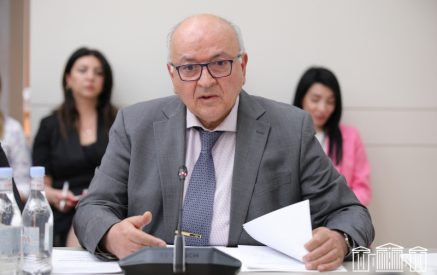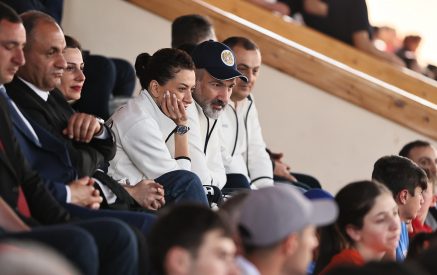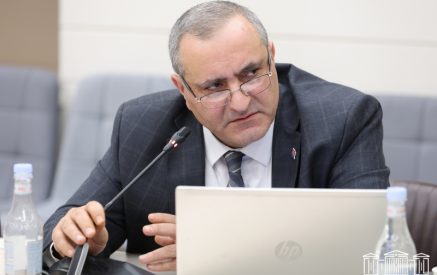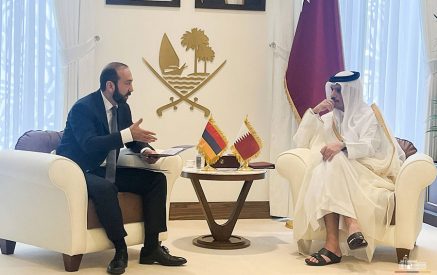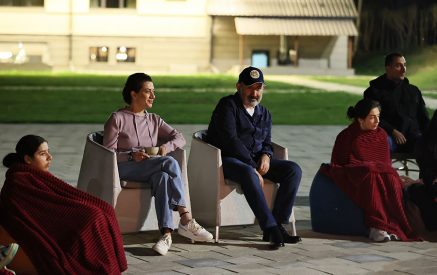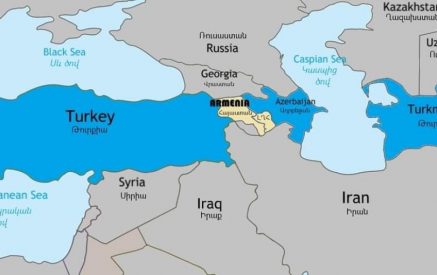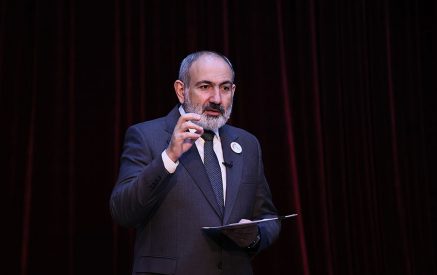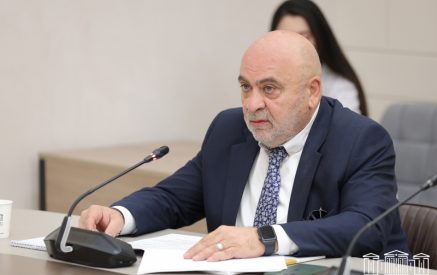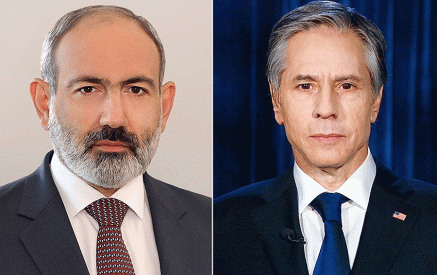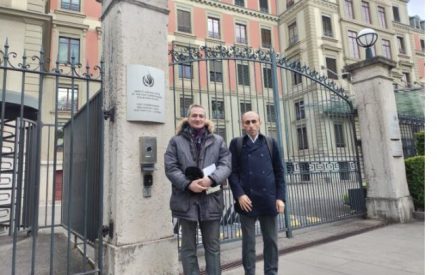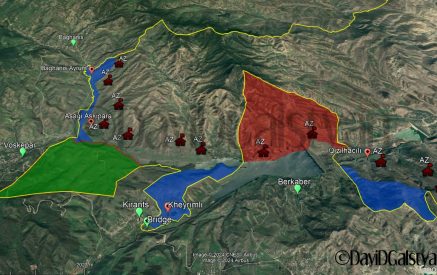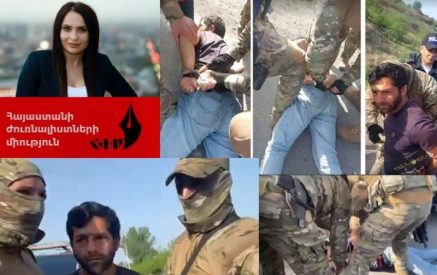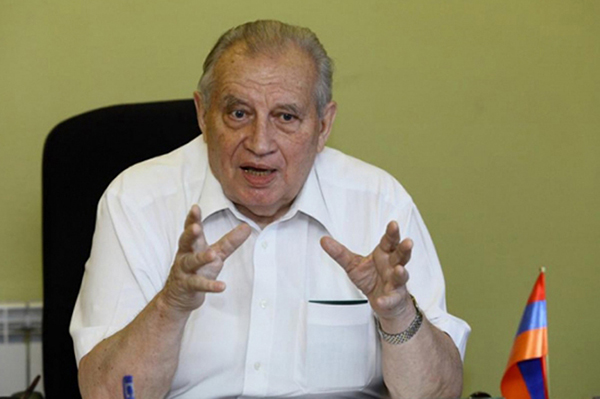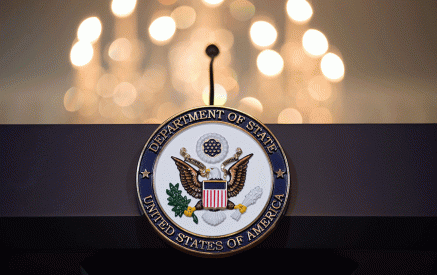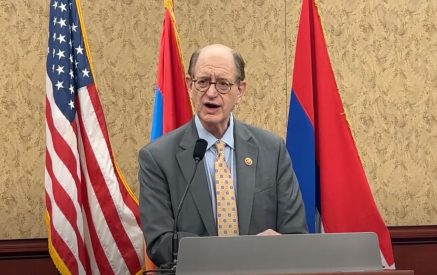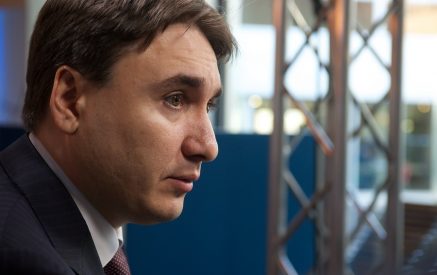Vladimir Kazimirov, the former Russian Co-chair of the OSCE Minsk Group, head of the Russian mediator mission, Plenipotentiary of the RF President on Nagorno-Karabakh (between 1992 and 1996), is convinced that it is the failure of officially attributed commitments by one of the parties.
– Mr. Kazimirov, first of all, how do you assess the recent tripartite talks in St. Petersburg?
– The fact of the tree presidents in St. Petersburg can only be applauded and express a hope that such meetings henceforth will be continued. But there is no rush to assess the outcome of the negotiations. No matter how attractive the Presidents’ statements are, it should be appraised by actions of whether the agreements reached will be fulfilled. The current disaster of the Karabakh conflict settlement is the failure to meet the agreements and in the case of one of the parties – the commitments.
– Mr. Kazimirov, you were the head of the Russian mediator mission, Plenipotentiary of the RF President on Nagorno-Karabakh between 1992 and 1996, and also former Russian Co-chair of the OSCE Minsk Group. Are you considered to be the co-chair knowing the nuances of the Karabakh settlement process in the most detailed way? First of all, I am interested in your assessment, why did Azerbaijan apply for aggression in April? How can you explain it?
Read also
– The military adventure in early April, no matter it is not emphasized against the background of the former one, it is fully consistent with the general approach of official Baku on the Nagorno-Karabakh conflict settlement. The periodic activation and maintenance of tension were also carried out by them in the past. Their main posture is “not to leave the occupants in peace.” This includes Baku’s actions: the arms race, the militaristic rhetoric, periodical incidents, Armenophobism, etc. The goals are as domestic so as foreign policy. Your own citizens should be convinced that the Republic of Azerbaijan does not reconcile with the outcome of the war. In foreign policy, it is a mean of pressure not only against the Armenians but also the mediators, the OSCE and the international community in general.
– The four-day war in April raised a number of question, particularly the question of why in 1994 when the Armenian side reported victories in the forefront and on the diplomatic front, it did not force Azerbaijan to sign a peace agreement. Were there similar attempts at the time? Why was the peace agreement not signed after the signing of a ceasefire in May 1994?
– In the spring of 1994, a unique opportunity was created to bring the parties to cease of the conflict and hostilities. And it was a priority issue for us. Missing this opportunity for the sake of studying other problems, would mean a continuation of the tragedies of the two peoples. And yet it is unknown when it would be possible to reach a ceasefire again.
– Now, we often talk about the fact that it is no longer possible to advance with the Madrid principles. Baku officially speaks about the “Lavrov plan”. In April, Russian Foreign Ministry official representative Maria Zakharova mentioned a day before Russian Foreign Minister Sergey Lavrov’s visit to Yerevan that S. Lavrov never goes anywhere empty-handed. Does Russia has separate ideas and suggestions?
– Russia had relevant proposals and ideas at all stages of the Karabakh conflict settlement, which not at the same time but as a rule were eventually adopted by the OSCE Minsk Group. But I am not aware of any comprehensive plan.
– On March 31, when Serzh Sargsyan and Ilham Aliyev were in Washington, Zakharova announced that Russia and the US are jointly working for the settlement of the Nagorno-Karabakh conflict, however, “I can’t say that Moscow and Washington have identical or coinciding approaches to all issues.” In your impression, are there different approaches and discrepancies between Russia and the US on the Karabakh conflict settlement?
– There were a lot of discrepancies between Russia and the United States on Karabakh conflict settlement in the early 90s, but now they are much less than in other international issues. The quite coordinated operations of Russia, France and the United States in the OSCE Minsk Group are gratifying.
– For a long time, Baku officially refrained from accepting the idea of using mechanisms for investigating the border incidents. Azerbaijani authorities seem not to be oriented with the proposal of the co-chairs to expand the powers of the Personal Representative of the OSCE Chairperson-in-Office, Andrzej Kasprzyk, and controversial statements are voiced from Baku. While, Armenia has accepted these ideas. Azerbaijan’s posture in such a situation clearly shows who is the creator of tension on the contact line. Why is the international community not voicing earmarked criticism against the official Baku? This gives Aliyev a carte blanche for resorting to aggression again, doesn’t it?
– Everyone remembers how Baku was obstructing the easing of the tension along the contact line (it was reluctant to withdraw snipers from the front line, was opposing to carry out an investigation of the border incidents, and was refraining from adopting confidence-building measures and so on). The co-chairs and international organizations for a long time were reluctant to criticize the parties to the conflict but being loyal to this “neutrality” is more difficult.
– Mr. Kazimirov, the violation of military balance between Armenia and Azerbaijan seems to be already indisputable, and it is sad that Armenia’s strategic ally Russia has contributed to it by arming Azerbaijan for years. How realistic do you think is the outbreak of the full-scale war?
– Unleashing a large-scale war around Karabakh is totally unacceptable. Suffice only to imagine one more hotbed of war in addition to Syria, Iraq and Afghanistan, the unacceptability of such a situation will immediately become obvious. This is what Moscow considers unacceptable, which is important. As well as the OSCE’s position that is engaged in the Karabakh settlement issue since 1992 cannot tolerate such a war. Also, the UN Security Council that has an experience of sabotage of urgent fulfillment of requirements of its four resolutions in 1993 cannot remain indifferent in the case of such a recurrence. Along with the international organizations, Russia both as a CSTO member and as a close neighbor to the region will have more than enough grounds for specific actions. I assume that they clearly understand where it is necessary.
– And such a question and I would like you to be sincere by giving “not a diplomatic” answer. Are the parties ready for the Nagorno-Karabakh conflict settlement? Generally, does this conflict have a solution? For example, there are people who say, either a war or the Dayton option, a coercion of peace to the parties.
– Objectively, the Karabakh conflict despite a number of difficulties undoubtedly has a peaceful settlement. It all depends on whether the leaders of the parties to the conflict have enough wisdom and political will. It seems that one of them is already striving to sit on the throne and transfer the settlement to the next generation. As for the coercion of peace… It is more precise to say not a coercion but a peace compulsion, it can also be considered acceptable but not by the force manners but by convincing the leaders of the parties and their societies, in the context of the desperateness of defending maximalist positions, which only extends the solution of the problem. Now, the fundamental question is as follows: to eliminate any possibility, moreover, any attempt to return the solution to the problem by force. Total elimination of the possibility of a new war would open a true way for mutual concessions, complex but rescuing concessions.
EMMA GABRIELYAN
“Aravot” 30.06.2016



